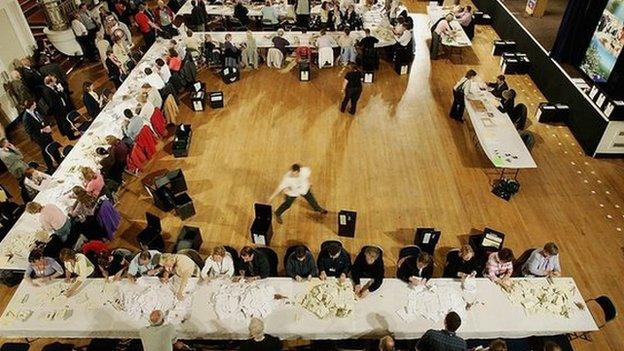Election results: What happens next?
- Published
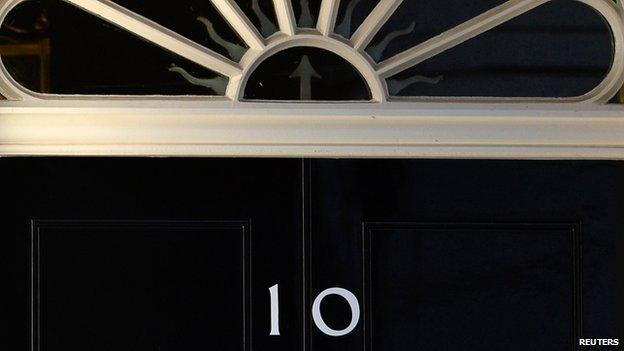
If there is a hung Parliament, who ends up in Number 10 will depend on a number of factors
With more than 550 of the 650 seats declared, David Cameron is on course to return to Downing Street as prime minister with the Conservatives as the largest party. A BBC forecast gives him 325 seats. Here is everything you need to know about what happens next.
The Conservatives have emerged as the party with the most MPs - so will they form the next government?
Yes, almost certainly. The party with the most MPs is normally described as the winner, and its leader nearly always goes on to become the next prime minister.
How does someone win the election?
The easiest way to become prime minister is to win what is called a majority in the House of Commons - a majority is where your party has more MPs than all the other parties put together.
How many MPs do you need to form a majority?
The official winning line is 326. That would be enough for a government to vote through new laws without being defeated by their opponents. However, with Sinn Fein historically not taking their seats and the Commons Speaker not voting, the actual figure is slightly lower. The Conservatives are currently projected to win 325 seats, which would be enough to give them a slender majority. Sinn Fein has won four.
What is a hung Parliament?
When no single party can get enough MPs to form a majority on its own the Parliament is said to be "hung". This happened at the 2010 general election.
What happens if there is another hung Parliament?
It depends on the numbers. If the polls are correct it looks like the Conservatives will be close enough to a majority to have the option of either trying to do a coalition deal with another party to get them over the 326 mark, or to go ahead and try and run as a minority government, relying on the support of smaller parties when they need to get contentious laws passed.
David Cameron is expected to set out his plans later.

Reading on the BBC News app? Click here to play our hung parliament game, external.
*Each result is randomly generated and not a prediction of the election - read more.

Who gets the first go at putting together a deal?
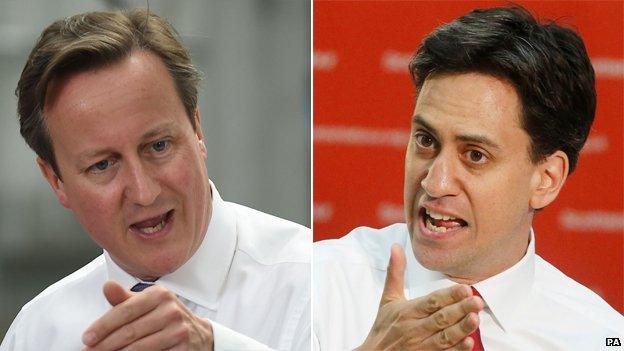
The Conservatives' decisive lead over Labour, in terms of their number of seats, means that they are the only party that can feasibly form a government.
How long does it take to form a government?
There is no official time limit. It took five days to put the coalition together in 2010 but is expected to happen a lot more quickly this time.
Negotiations can't go on indefinitely, surely?
The first deadline is Monday 18 May, when the new Parliament meets for the first time. David Cameron has until this date to put together a deal to keep himself in power or resign, according to official guidance issued by the Cabinet Office., external
What if it is still not clear a new government can be formed?
The only test for whether a government can be formed is whether it has the confidence of the House of Commons.
In other words, can it assemble the votes it needs to get its programme of proposed new laws passed in the Queen's Speech? The date of the Queen's Speech is Wednesday 27 May.
David Cameron must be confident of getting enough votes from other parties to get his programme passed. However, if the SNP has as many MPs as the polls suggest they will, they could play a crucial role. They have said they will not support a Conservative government. Would they vote down a Labour Queen's Speech?
What role does the Queen play?
The leader of the party that can tell the Queen they have a workable Commons majority is the one Her Majesty will authorise to form a government.
By convention, the Queen does not get involved in party politics, so there are no circumstances in which she would choose the prime minister.
There have been suggestions that she may not deliver the Queen's Speech in person if there's a question mark over whether it will get voted through.
Who runs the country while negotiations are taking place?
Britain's top civil servant, Cabinet Secretary Sir Jeremy Heywood, has said he believes the prime minister should remain in office until a power-sharing deal is clinched. This happened in 2010 when Gordon Brown remained in Number 10 until the Lib Dems and Conservatives put together a coalition despite press accusations he was "squatting".
What about ministers who lose their seats?
Senior Lib Dem figures such as Nick Clegg, Vince Cable and Danny Alexander will leave office immediately once a new government is formed, as the party are not expected to play a part in the next government. Mr Cable and Mr Alexander are among top Lib Dems to lose their seats.
What role would the civil service play?
Civil servants would remain impartial and offer administrative support to all sides taking part in power-sharing talks.

What is a coalition?
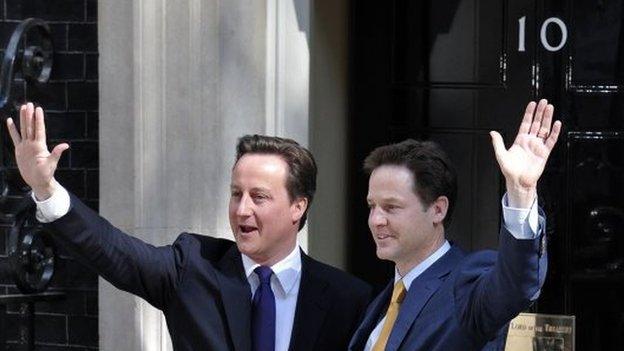
A coalition is when two or more parties join forces to govern as a single unit. The junior partners are given ministerial jobs and a joint programme for government is set out.
Will there be another coalition this time?
This now looks unlikely. However, it depends on four factors:
Whether the potential coalition partners have enough MPs between them to command a workable majority.
Whether the biggest party wants to do it or would prefer to try governing alone as a minority government.
Whether the potential partners can convince their respective parties that it is a good idea. David Cameron has promised to give his party a say before entering into another coalition, as Nick Clegg did with the Lib Dems in 2010 and would do again now. There is no guarantee they would get this backing. Ed Miliband has yet to comment on whether he would give Labour members a say but he would have to convince his MPs.
Whether they can find enough common ground on policy - the junior partners will inevitably have to ditch some of their policies but they will insist on keeping others.
What are 'red lines'?
These are the policies potential junior partners in a coalition will insist on keeping.
The SNP would insist on Britain's Trident nuclear weapons being scrapped and a halt to public spending cuts.
UKIP have said they want a referendum on Britain's membership of the EU this year.
The Liberal Democrats set out five "red lines": A £12,500 personal tax-free allowance, increased spending on education, a "stability" budget within the first 50 days, an end to public sector pay restraint and more money for the NHS.

What is a minority government?
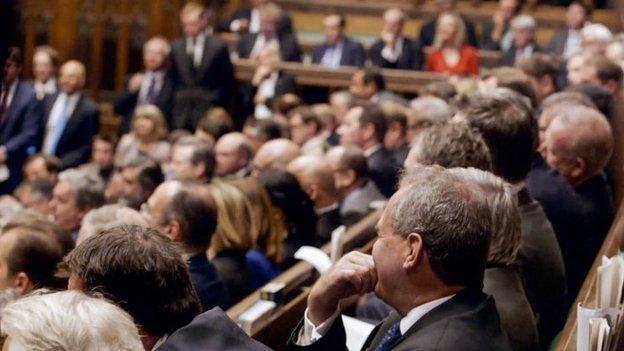
If the Conservatives are unable to put together a coalition or decide to go it alone, they can form a minority government, filling all the ministerial positions themselves.
It means they won't be able to get all of their policies through but may have to make fewer concessions to smaller parties than if they were in a formal coalition.
Here is a full breakdown of where all the parties stand on post-election deals with each other.
And this is list of the jargon, words and phrases that are commonly used in British politics.
How many MPs would a minority government need for it to be a feasible option?
A party could fall well short of an outright majority and still run a minority government. Sinn Fein don't take up their seats in the Commons so if they return five MPs again, the overall majority target falls to 323.
A new Conservative government will also face a fractured opposition. For it to be defeated, Labour, the Lib Dems, SNP, UKIP, Plaid Cymru, the Greens and the DUP would all have to gang up together to vote against it.
This would not happen very much in practice. It is not enough for the losing parties to have more MPs than the "winner". They have to be able to form a coherent alternative.
So the party that finishes second in the election could form a government?
Yes, in theory. But in this case this will not apply and, anyway, there is a question mark over whether the public would accept it.
How stable would a minority government be?
Britain has had minority governments before, although they have rarely lasted long.
The SNP governed in Scotland as a minority government between 2007 and 2011. It means the government has to form alliances and deals with smaller parties to secure their support in Commons votes - but they can achieve some stability by entering into a "confidence and supply" agreement with another party.

What is a "confidence and supply" agreement?
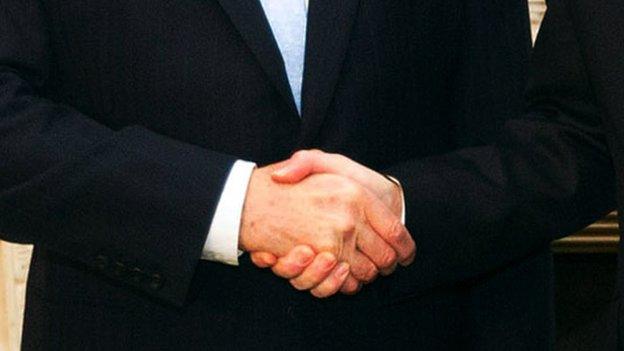
When a smaller party, such as the SNP or the Lib Dems, agrees to support a larger party, such as Labour or the Conservatives, in key Commons votes to keep it in power is called "confidence and supply".
The smaller party's MPs are unlikely to be given ministerial jobs but they will have some say over the policies of the new government. It is a looser arrangement than a full coalition.
What does the "confidence" bit mean?
Governments usually fall when they are defeated in the Commons on a "confidence" vote. Under a "confidence and supply" arrangement, the junior coalition partner would agree to support the government if the opposition attempted to topple it by tabling a "confidence" motion.
What does the "supply" bit mean?
This is a reference to finance bills - legislation to supply the minority government with the money it needs to enact its policies. The junior coalition partner would vote with the government to ensure they got their Budgets through the Commons.
What about a "vote-by-vote" deal?
This is a looser arrangement than "confidence and supply". It means the minority government could count on the support of a smaller party in some votes but not in others.

Will there be another election?
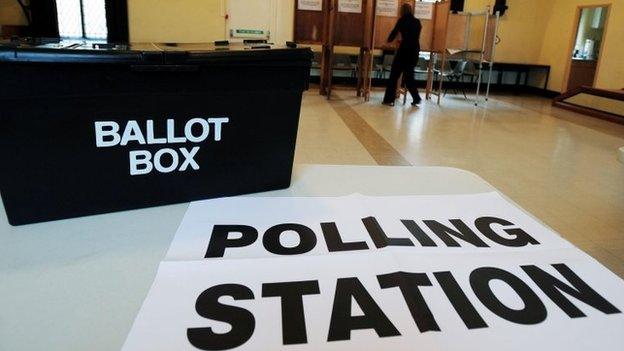
In the past, when minority governments have been formed at Westminster, the prime minister has held another election at the earliest opportunity to try and gain a working majority. Or the opposition has forced another election by tabling a "confidence" motion.
The first of these options will not be possible this time and the second one will be more difficult.
The Fixed-Term Parliament Act - passed by the Lib Dems and Conservatives to make their coalition less likely to collapse - has set the date of the next election in May 2020.
An election can only be held before that date if:
Two-thirds of MPs vote for it. In practice, that would mean it would need to be supported by both Labour and the Conservatives
A motion of "no confidence" in the government is passed by a simple majority of MPs. An election must then be called within 14 days unless a new government can win a confidence vote before that period is up
Previously, if a government could not get a Budget or a Queen's Speech through the Commons, it was considered an effective vote of "no confidence".
But under the Fixed Term Parliament Act, the only confidence motion MPs can vote on is this: "That this House has no confidence in Her Majesty's government". This makes it more difficult to for a government to fall.
Is there any way round this?
We are in uncharted waters here. Britain does not have a written constitution and experts are divided over what may happen if no one can form a government.
Here are some alternative scenarios:
If a "no confidence" motion is passed is in the Commons, the prime minister could hand the party leadership to a colleague, who could have another try at winning a confidence vote before the 14 day grace period is up.
If the prime minister wanted to trigger an early election, he could table a "no confidence" motion in his own government and order his MPs to abstain but, as YouGov polling expert Peter Kellner has pointed out, this would risk the ridicule of MPs and the public.
The prime minister could resign, after being defeated on the Queen's Speech for example, and hand power to the leader of the opposition, who would attempt to govern until 2020. This raises the prospect of a change of governing party without an election - something that has never happened in Britain and would be likely to trigger a constitutional crisis.
So the prime minister may have to carry on even though he can't get key legislation passed?
It's possible. If a minority government is defeated on its Budget, the prime minister would normally follow this up with a confidence vote to trigger a new election.
But if the main opposition party does not want another election, because it thinks it could not win, then it could refuse to table a "no confidence" motion.
In that scenario, the prime minister could theoretically remain in Number 10, despite being defeated on a key part of his economic programme.

BBC News Timeliner

Winners and losers. Laughter and tears. Celebrities and the general public. Find echoes of the current campaign on a trip through the archive of elections past.
Watch video from the vaults on the BBC News Timeliner, external
- Published6 May 2015
